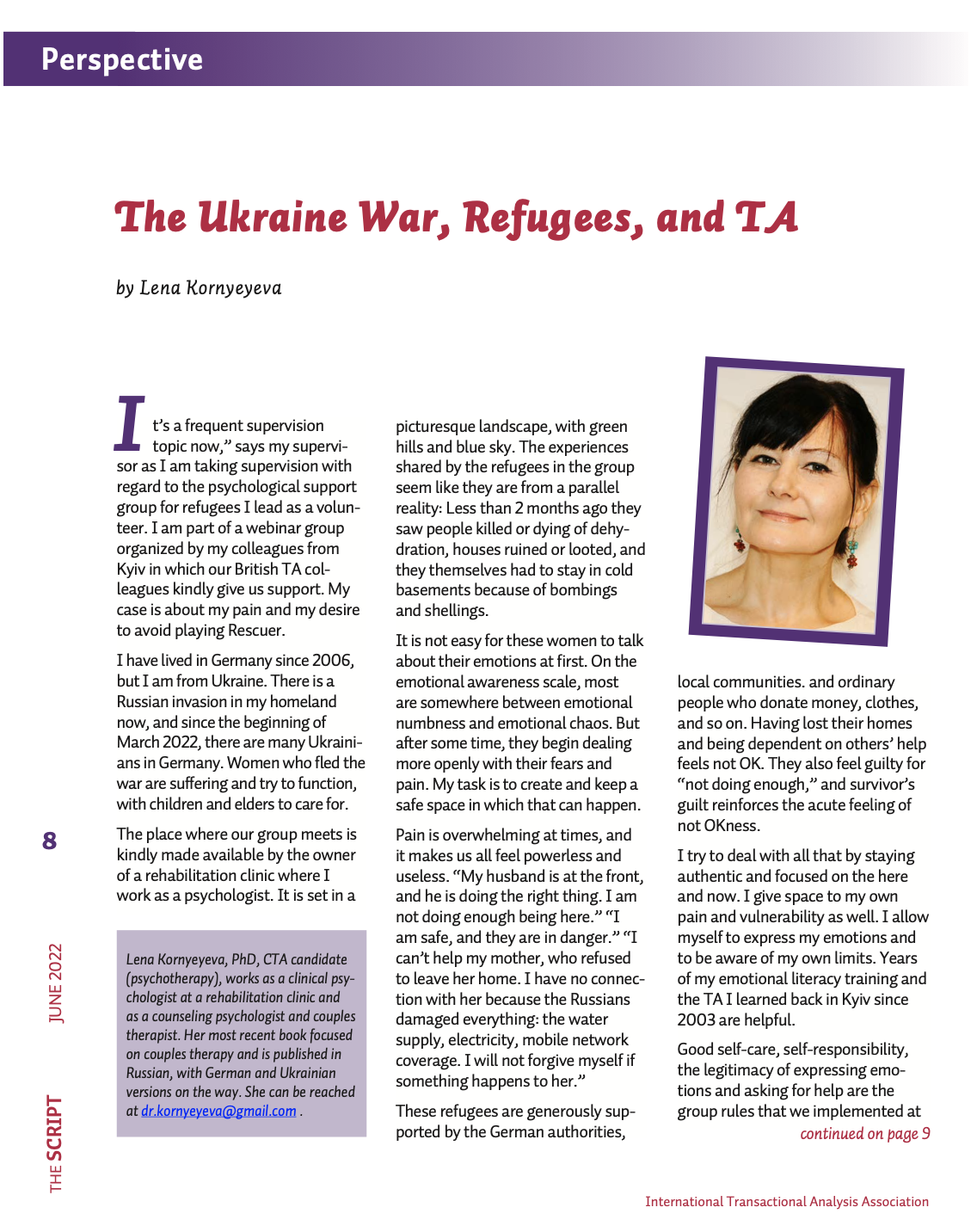(For some reason I didn’t post this article back then, but it’s never too late)

It’s a frequent supervision topic now,” says my supervisor as I am taking supervision with regard to the psychological support group for refugees I lead as a volunteer. I am part of a webinar group organized by my colleagues from Kyiv in which our British TA colleagues kindly give us support. My case is about my pain and my desire to avoid playing Rescuer.
I have lived in Germany since 2006, but I am from Ukraine. There is a Russian invasion in my homeland now, and since the beginning of March 2022, there are many Ukrainians in Germany. Women who fled the war are suffering and try to function, with children and elders to care for.
The place where our group meets is kindly made available by the owner of a rehabilitation clinic where I work as a psychologist. It is set in a picturesque landscape, with green hills and blue sky. The experiences shared by the refugees in the group seem like they are from a parallel reality: Less than 2 months ago they saw people killed or dying of dehydration, houses ruined or looted, and they themselves had to stay in cold basements because of bombings and shellings.
It is not easy for these women to talk about their emotions at first. On the emotional awareness scale, most are somewhere between emotional numbness and emotional chaos. But after some time, they begin dealing more openly with their fears and pain. My task is to create and keep a safe space in which that can happen.
Pain is overwhelming at times, and it makes us all feel powerless and useless. “My husband is at the front, and he is doing the right thing. I am not doing enough being here.” “I am safe, and they are in danger.” “I can’t help my mother, who refused to leave her home. I have no connection with her because the Russians damaged everything: the water supply, electricity, mobile network coverage. I will not forgive myself if something happens to her.”
These refugees are generously supported by the German authorities, local communities. and ordinary people who donate money, clothes, and so on. Having lost their homes and being dependent on others’ help feels not OK. They also feel guilty for “not doing enough,” and survivor’s guilt reinforces the acute feeling of not OKness.
I try to deal with all that by staying authentic and focused on the here and now. I give space to my own pain and vulnerability as well. I allow myself to express my emotions and to be aware of my own limits. Years of my emotional literacy training and the TA I learned back in Kyiv since 2003 are helpful.
Good self-care, self-responsibility, the legitimacy of expressing emotions and asking for help are the group rules that we implemented at
The place where our group meets is kindly made available by the owner of a rehabilitation clinic where I work as a psychologist. It is set in the beginning along with the value principle, which means “Everybody has equal value and worth.” It helps to stay aware of any manifestations of the devaluing Critical Parent and to consciously exclude them from our interactions.
It is also useful to stay aware of the stroke economy. Positive stroking works as a mighty facilitator of OKness. Its effect is empowering and liberating. We are neither helpless nor powerless if we accept the offered help and do what we can. It is enough in such a situation as the one we find ourselves in now.
Lena Kornyeyeva, PhD, CTA candidate (psychotherapy), works as a clinical psychologist at a rehabilitation clinic and as a counselling psychologist and couples therapist. Her most recent book focused on couples therapy and is published in Russian, with German and Ukrainian versions on the way. She can be reached at dr.kornyeyeva@gmail.com

